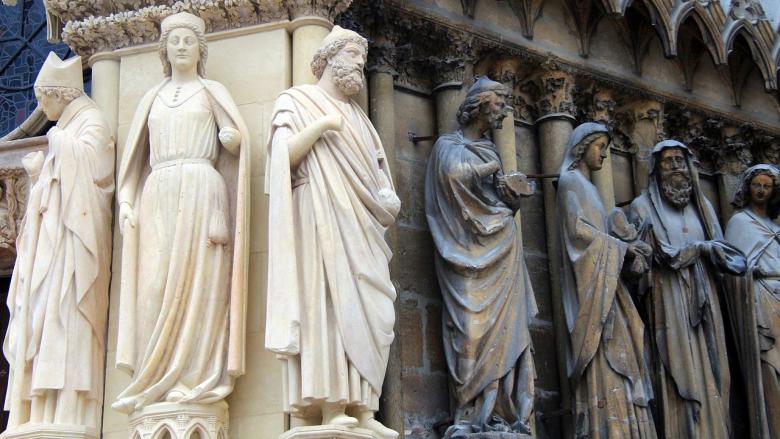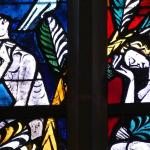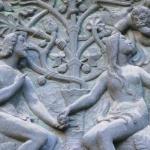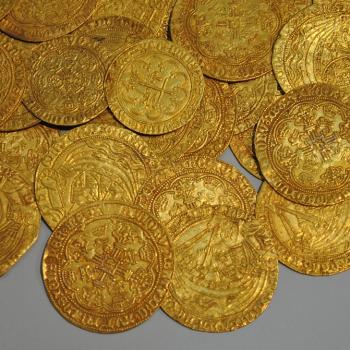
We’re finally here! We’re at the doorstep of the start of Original Sin. More specifically, we’re going to talk about the Pelagian Controversy. If you missed it, you can see the roots of Original Sin in other Mediterranean religions and where Original Sin came from.
So – what is the Pelagian Controversy? Let’s start with Augustine.
Augustine of Hippo
Augustine of Hippo (354-430 CE) was born in North Africa to a Pagan father and Christian mother. He was slow to be a good student, but eventually studied Latin literature and became a preacher and orator. Still, he was not an academic. He did not know Greek or Hebrew and was reliant on Latin translations – an issue we saw earlier with Ambrosiaster.
Augustine was firmly in the Latin camp. He saw that Original Sin was the source of evil in the world, passed down from Adam. This is in part due to Augustine’s teen and early adult years of debauchery and foolishness as a Manichaean orator.
“Therefore was I at strife with myself, and rent asunder by myself. And this rent befell me against my will, and yet indicated, not the presence of another mind, but the punishment of my own. Therefore it was no more I that wrought it, but sin that dwelt in me; the punishment of a sin more freely committed, in that I was a son of Adam.” – Augustine
Finally, the North African Church was a breeding ground for a more strict theology. From Toews:
“The harshness of life under the African desert sun had profoundly shaped the theological world views of Tertullian and Cyprian. Through their influence there had developed a legalistic and pitiless Latin-Punic theology. Traditional Christian thought in North Africa was narrowly defined with a predominantly forensic conception of sin and a quasi-commercial treatment of merit.”
The combination of limited academic abilities, negative personal experiences, and a rigid culture led to a more extreme view of hereditary sin.
Augustine’s Contributions
Augustine moved the Latin Church’s doctrine of Original Sin significantly. While his predecessor Ambrose was the first to posit the idea that Adam was perfect and immortal before the Fall, he includes Adam’s intellect as well. “Adam was an intellectual genius; his mental powers were far superior to those of the most brilliant philosophers and scientists of Augustine’s time—he could give appropriate names to all the animals.” (Towes) This intellectual advance of Adam furthered the devastation of the Fall. The Latin Church believed that it was jealousy and pride that caused Adam to sin – Augustine added the element of the will.
Augustine intensified the Latin Church’s ideas of Original Sin by making the original Adam incredibly great, deepening the rift between that Adam and the post-Fall Adam, and by reiterating the seminal delivery of sin. This intensity of Original Sin would lead to the excommunication of Pelagius, Caelestius, and several of their followers.
Pelagius
Much of the writings of Pelagius are lost, but we do have some fragments. We can also gleam a little by what writers like Augustine have written against. He was born in Britain or Ireland and eventually traveled to Rome in the 380’s CE, before eventually moving again to Carthage in 410 CE. He and his traveler Caelestius (sometimes spelled Coelestius) found themselves in trouble with Augustine and the Synods of North Africa.
Pelagius had a positive outlook on humanity. His theology of sin was that of the East – man was good but the world was a strong temptation to sin.
“Adam’s sin did have disastrous consequences for humanity; it introduced death and the habit of disobedience. But the latter was propagated by example, not by physical descent.” He disavowed any type of predestination of the human soul to destruction, and saw “the assumption that human beings were born with a bias toward sin was an insult to God…” – Towes.
In Pelagius’ Commentary on Romans 5, he makes a distinction between inherent sin nature and what the Greek Church would call the Adamic example of sin. “By example or by pattern. Just as through Adam’s sin came at a time when it did not yet exist, so in the same way through Christ’s righteousness was recovered… And just as through the former’s sin death came in, so also through the latter’s righteousness life was regained… As long as they sin the same way, they likewise die.” This is a radically different view from Augustine. Where Augustine thought Adam’s sin was universally damaging, by transmitting the sin nature, removing our natural immortality, and our inability to be good enough to live without sin, Pelagius affirmed these statements.
The Controversy
Pelagius and Caelestius’ trouble began shortly after arriving at Carthage. Caelestius was on trial in 411 or 412. The Synod claims that Caelestius was teaching against the Catholic Church, specifically the idea that babies were in the same state as Adam before the fall. To this, at the end of the transcript we have, he replies, “As touching the transmission of sin, I have already asserted, that I have heard many persons of acknowledged position in the catholic Church deny it altogether; and on the other hand, others affirm it: it may be fairly deemed a matter for inquiry, but not a heresy. I have always maintained that infants require baptism, and ought to be baptized. What else does he want?”
Augustine writes City of God in the midst of the Pelagian conflict. He defends the idea that sin is hereditary, passed down by our universal parents (Adam). “In the first man, therefore, there existed the whole human nature, which was to be transmitted by the woman to posterity, when that conjugal union received the divine sentence of its own condemnation; and what man was made, not when created, but when he sinned and was punished, this he propagated, so far as the origin of sin and death are concerned.” Whether souls existed before birth or after, Augustine’s hereditary sin nature was propagated through procreation.
The Lydda Synod
In 415 CE, Pelagius was brought in front of the Lydda Synod for heresy. The council is concerned about Pelagius’ teachings that a person can live a sinless life. They say, “ ‘No man can be without sin unless he has acquired a knowledge of the law.’” After his excommunication, believed to be around 417 CE, Pelagius sent a confession to Pope Innocent I on behalf of himself and his followers. In the same vein, Caelestius sends a confession, and they affirm the Nicene Creed and denounce several other heretical factions. However, Pope Innocent I had died before the letters arrived, and Pope Zosimus found no heresy in Pelagianism.
Finally, on May 1, 418, the North African Synod put forth a list of 19 Canons to completely deny Pelagianism as orthodox. In this proclamation, they claim that those who believe Adam was created mortal before the Fall, that God’s grace is sufficient to not sin, and those who deny our innate nature of sin, are heretics and should be anathematized. The controversy was decided and Christianity in the majority of the Mediterranean was to fall in line behind Augustine and the Latin Church.
Now What?
This was a long one, but it’s important. The normalization of Original Sin comes from a poorly translated Greek manuscript. This was then read by someone without the knowledge of the original language. Augustine’s life influenced his interpretation, and his influence led the Western Church to this decision. The Church needed uniformity and they stifled Pelagius and his followers. The history of the Church is so important to know!
 Brad is a graduate student at Northwind Theological Seminary studying theology and the changing religious landscape in America. He works as a co-investigator at the University of Rhode Island’s College of Pharmacy providing education and support for rural New Englanders impacted by the opioid epidemic. Brad spends nights and weekends playing in regional bands as a bassist, guitarist, and vocalist. When not at a computer, he loves to spend time with his wife and chasing his toddler around the house. You can go to his website to get updates on his writing and other events.
Brad is a graduate student at Northwind Theological Seminary studying theology and the changing religious landscape in America. He works as a co-investigator at the University of Rhode Island’s College of Pharmacy providing education and support for rural New Englanders impacted by the opioid epidemic. Brad spends nights and weekends playing in regional bands as a bassist, guitarist, and vocalist. When not at a computer, he loves to spend time with his wife and chasing his toddler around the house. You can go to his website to get updates on his writing and other events.













